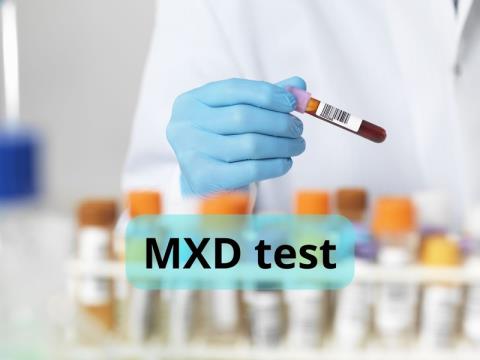Newborn otitis media or neonatal middle ear infection is very common in babies between 5 months and 36 months of age. According to the statistics of the American Academy of Pediatrics (AAP), the chance of babies having otitis media in the first years of life accounts for a very high rate.
Middle ear infections in babies are very common nowadays. Symptoms often appear and may disappear on their own after a few days or may last longer and require intervention. The disease not only affects children's lives, middle ear infections also create conditions for a number of ENT diseases to develop, causing many dangerous complications if infants are not treated early and properly such as: Complications of perforated eardrum , brain abscess and even meningitis .
About 23% of babies are at risk of having an ear infection or otitis media at least once in their life when they are between 5 and 12 months old, and this rate can increase to about 12% among those aged 18 years. up to 36 months old. Middle ear infections in infants have the potential to affect the baby's ear canal and middle ear.
What is otitis media in infants?
Otitis media in infants is a condition in which a child's middle ear is attacked by bacteria or viruses and causes an infection. Symptoms of otitis media in infants often stem from typical viruses and bacteria such as from colds, sore throats and some other related diseases. Newborns with otitis media are divided into several specific types as follows:
- Acute otitis media (AOM): An infection of the ear canal with fluid accumulation in the ear caused by a bacterial infection.
- Otitis media: A buildup of fluid behind the eardrum of a child's ear.
- Otitis media with effusion (OME): An infection caused by fluid buildup in the middle ear that doesn't cause pain or fever.
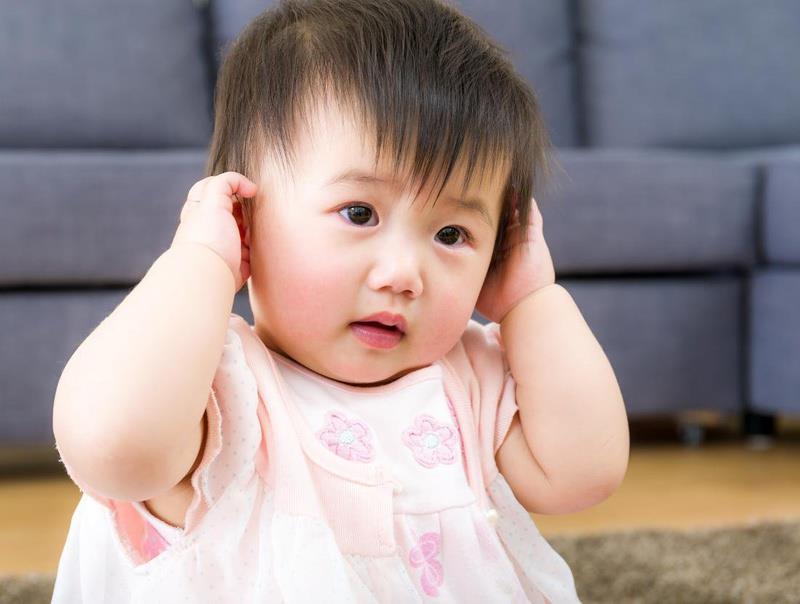 Middle ear infections in babies are very common nowadays
Middle ear infections in babies are very common nowadays
Symptoms of otitis media in infants
One of the most common signs of otitis media in infants is that the infant often tugs at the ear, pulls the ear, and cries violently. These actions are natural due to the child's reflexes when the ear feels uncomfortable.
In addition, neonatal otitis media also causes some specific symptoms as follows:
- Newborn babies cry more than usual, especially when lying down.
- Newborns often have vomiting and diarrhea.
- The child is anorexic and refuses to breastfeed.
- Newborns have difficulty sleeping and hearing is limited.
- There are signs of mild fever, moderate fever and headache.
- The ear may have a yellow or white discharge.
- Children's ears have an unpleasant odor.
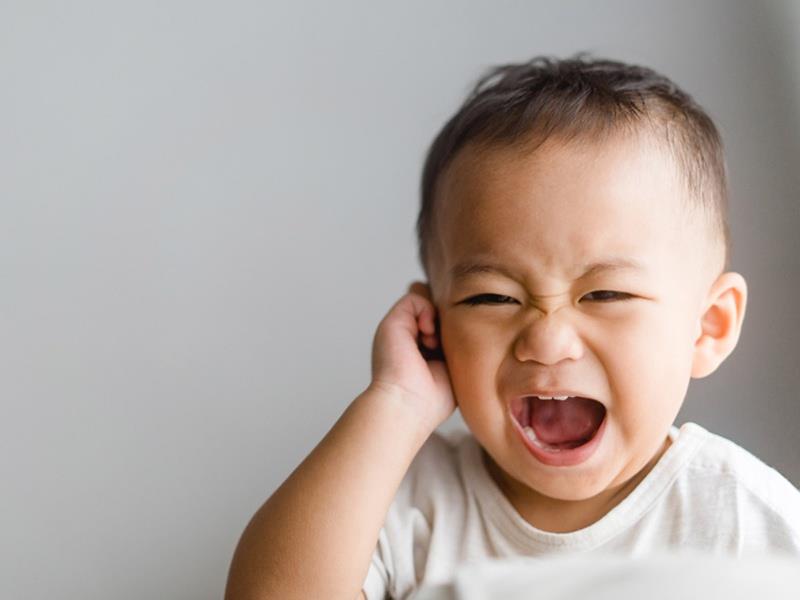 The most common sign of otitis media in infants is the child often tugging at the ear
The most common sign of otitis media in infants is the child often tugging at the ear
Diagnosis of otitis media in infants
Usually, the symptoms of ENT disease are very similar and can confuse parents. On the other hand, the tympanic membrane is difficult to see and the signs are not always obvious. Therefore, take your newborn to a specialist when having the above symptoms. The doctor may perform a number of specialized operations to make an accurate diagnosis of your child's condition.
The doctor will then examine the ear with an otoscope to see the inside of the eardrum. In addition, the child may have some tympanometry tests to check the movement of the eardrum. In case the child has an ear infection, the child should have a hearing test and have the most appropriate treatment.
Is otitis media in babies dangerous or not?
Newborns are susceptible to ear infections because their immune systems are not yet fully developed and their ability to fight off infections is often not high. Mothers also do not worry too much because as the child grows older, the child's immune system is capable of fighting off the agents that cause otitis media.
However, middle ear infections in infants can cause perforation of the eardrum because the fluid weakens the tissue and disrupts blood circulation. What's more, babies are at risk of short-term hearing loss, which is also a common complication of an ear infection. In addition, middle ear effusion can also disrupt the infant's language development because hearing is affected.
Although otitis media in newborns is not too dangerous, in some cases, if the disease is not detected and treated properly, there is a risk of unwanted complications. When the inflammation is left untreated for a long time, the infection gradually spreads to the brain, causing many dangerous complications such as meningitis or brain abscess... affecting the current and future quality of life of newborns. .
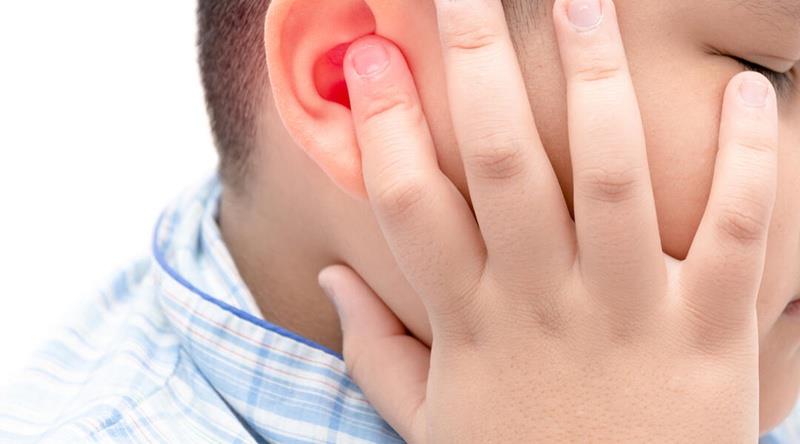 Is otitis media in babies dangerous is the question of many parents
Is otitis media in babies dangerous is the question of many parents
Treatment of otitis media in infants
Almost all middle ear infections in babies are likely to go away on their own. But for some cases of severe and severe inflammation, it is imperative that the child be prescribed antibiotics. However, about drugs and dosages used, parents should strictly follow the instructions of the treating doctor, should not arbitrarily buy any drugs used for children's ears to arbitrarily treat ear infections. middle for infants. Because some ingredients in antibiotics have the risk of causing potential side effects, affecting the health of children later.
Besides, in the course of treating the child under the guidance of a specialist doctor, if the child's ear infection does not show signs of improvement after a few days, the accompanying symptoms also do not improve... take the child. Go to the hospital immediately for timely care, examination and treatment.
In addition, to prevent otitis media in infants , parents should take their children to the vaccination center to receive pneumococcal and flu vaccines to limit the cause of otitis media in children. . Not only that, should keep the ear hygiene for children properly. During the cleaning process, avoid getting the cotton swab too deep inside the child's ear. It is necessary to limit children's exposure to or places with cigarette smoke , which is also an effective prevention measure.

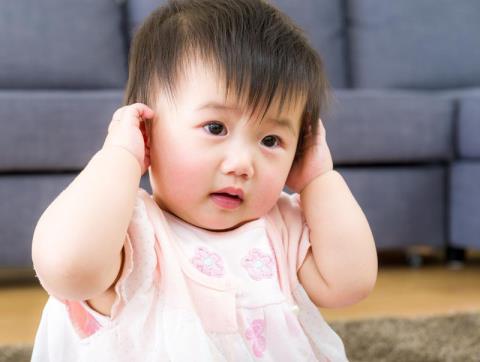
 Middle ear infections in babies are very common nowadays
Middle ear infections in babies are very common nowadays The most common sign of otitis media in infants is the child often tugging at the ear
The most common sign of otitis media in infants is the child often tugging at the ear Is otitis media in babies dangerous is the question of many parents
Is otitis media in babies dangerous is the question of many parents



